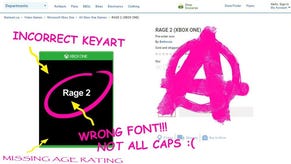id Tech 5
Steve Nix on the growth of id's next engine.
I don't think we need to really be concerned with anyone else's pricing, because we believe we have the best technology solution available. However, we have a history of very fair pricing for our technology. For our older technologies the pricing's on the webpage - you can look them up. I think we've got id Tech 4 currently at USD 250,000 against 5 points. I'd verify that actually, before you put it! [id Tech 4 page on idsoftware.com] For all the older stuff, we have the pricing up there.
The only reason we haven't been very public about id Tech 5 pricing is because honestly we haven't developed our final plan there. But we have a history of - like I said - being pretty fair, and I expect that our pricing will be...that we're not going to lose business based on price. If our engine's not quite the right engine for someone, for the type of game they want to make, they can make their decision, but I doubt we're going to lose business just solely focused on price.
We've talked about the various middleware, officially approved programmes, and we're having those discussions. Obviously we work closely with Sony, we work closely with Microsoft, we work closely with Apple and we work closely with Intel - and even with AMD and ATI and NVIDIA. We work closely with everyone. As far as the support level and our interaction with those companies, we work very closely with them. All the major players in hardware and OS regularly to the id offices and they'll meet with John and talk about their roadmaps and John will say 'here's where I think you should go'. John was a major player in Apple adopting GL as their rendering solution for the desktop. So John's always talking roadmap with those guys, and we have pretty good relationships.
Whether or not we take the more formal approach of being approved middleware providers, that's something we're talking about, but I don't know to what degree it...it'll help to some degree, but publishers for the most part and developers know who we are, they know we make great technology, and getting a stamp of approval, I'm not sure if that's a tremendous Delta Force honestly.

Yeah, I mean, a lot of times we don't think about things at id in pure business terms, and it's this really wicked catch-22 situation because if we did think about those things in pure business terms we would frequently make decisions that aren't as good as the decisions we end up making when we think about being game developers and technology developers. Unfortunately I think what happens is, if we thought about ourselves more in pure business terms we'd end up selling our souls to the point where we wouldn't make good technology and game decisions. So I really like the balance.
id's...clearly we're a healthy company, we've had a history of success, but we also get to do these really cool things just the way we want to do them, and I love that feeling that we're not having to make decisions for purely business reasons all the time.
And a lot of times what happens is, these things that business people - and I count myself as a business-person, that's my background - we say 'oh, what's id's doing there?' but it turns out to be extremely clever business decisions. John has a history of open-sourcing the id technology, and a lot of business people say 'that's crazy - you're giving away the farm', but the thing is that John's saying, 'I'm going to make new cool stuff - I don't care if people look at my old cool stuff'.
What happens though is that pretty much any time someone brings up a new rendering platform, the first thing they do is they bring up one of our games, and so these guys already know how to use our technology, they're playing around with id technology, they have technology on their mind, and also they're going in and showing high-level executives this new hardware that just happens to be running one of our games. So there's really not much value in those older engines, but what a lot of people said was really not a good idea turned out to be a good business decision, and that's just the way it turned out. I mean, John's so far ahead of all of this a lot of times in the way he sees the chess moves play out.
Steve Nix is director of business development at id Software. Part two of this interview (dealing with everything besides id Tech 5) will be published next week. Probably. STOP RUSHING US.
















